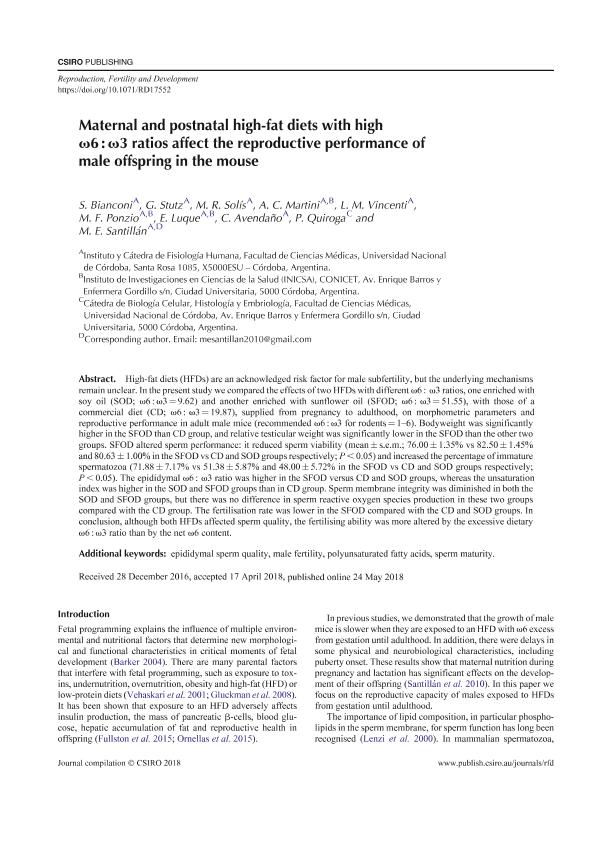Artículo
Maternal and postnatal high-fat diets with high ω6: ω3 ratios affect the reproductive performance of male offspring in the mouse
Bianconi, Santiago ; Stutz, Graciela; Solís, M. R.; Martini, Ana Carolina
; Stutz, Graciela; Solís, M. R.; Martini, Ana Carolina ; Vincenti, Laura María; Ponzio, Marina Flavia
; Vincenti, Laura María; Ponzio, Marina Flavia ; Luque, Eugenia Mercedes
; Luque, Eugenia Mercedes ; Avendaño, C.; Quiroga, P.; Santillan, M. E.
; Avendaño, C.; Quiroga, P.; Santillan, M. E.
 ; Stutz, Graciela; Solís, M. R.; Martini, Ana Carolina
; Stutz, Graciela; Solís, M. R.; Martini, Ana Carolina ; Vincenti, Laura María; Ponzio, Marina Flavia
; Vincenti, Laura María; Ponzio, Marina Flavia ; Luque, Eugenia Mercedes
; Luque, Eugenia Mercedes ; Avendaño, C.; Quiroga, P.; Santillan, M. E.
; Avendaño, C.; Quiroga, P.; Santillan, M. E.
Fecha de publicación:
05/2018
Editorial:
Csiro Publishing
Revista:
Reproduction Fertility and Development
ISSN:
1031-3613
Idioma:
Inglés
Tipo de recurso:
Artículo publicado
Clasificación temática:
Resumen
High-fat diets (HFDs) are an acknowledged risk factor for male subfertility, but the underlying mechanisms remain unclear. In the present study we compared the effects of two HFDs with different ω6: ω3 ratios, one enriched with soy oil (SOD; ω6: ω3 = 9.62) and another enriched with sunflower oil (SFOD; ω6: ω3 = 51.55), with those of a commercial diet (CD; ω6: ω3 = 19.87), supplied from pregnancy to adulthood, on morphometric parameters and reproductive performance in adult male mice (recommended ω6: ω3 for rodents = 1-6). Bodyweight was significantly higher in the SFOD than CD group, and relative testicular weight was significantly lower in the SFOD than the other two groups. SFOD altered sperm performance: it reduced sperm viability (mean ± s.e.m.; 76.00 ± 1.35% vs 82.50 ± 1.45% and 80.63 ± 1.00% in the SFOD vs CD and SOD groups respectively; P < 0.05) and increased the percentage of immature spermatozoa (71.88 ± 7.17% vs 51.38 ± 5.87% and 48.00 ± 5.72% in the SFOD vs CD and SOD groups respectively; P < 0.05). The epididymal ω6: ω3 ratio was higher in the SFOD versus CD and SOD groups, whereas the unsaturation index was higher in the SOD and SFOD groups than in CD group. Sperm membrane integrity was diminished in both the SOD and SFOD groups, but there was no difference in sperm reactive oxygen species production in these two groups compared with the CD group. The fertilisation rate was lower in the SFOD compared with the CD and SOD groups. In conclusion, although both HFDs affected sperm quality, the fertilising ability was more altered by the excessive dietary ω6: ω3 ratio than by the net ω6 content.
Archivos asociados
Licencia
Identificadores
Colecciones
Articulos(INICSA)
Articulos de INSTITUTO DE INVESTIGACIONES EN CIENCIAS DE LA SALUD
Articulos de INSTITUTO DE INVESTIGACIONES EN CIENCIAS DE LA SALUD
Citación
Bianconi, Santiago; Stutz, Graciela; Solís, M. R.; Martini, Ana Carolina; Vincenti, Laura María; et al.; Maternal and postnatal high-fat diets with high ω6: ω3 ratios affect the reproductive performance of male offspring in the mouse; Csiro Publishing; Reproduction Fertility and Development; 30; 11; 5-2018; 1491-1502
Compartir
Altmétricas



